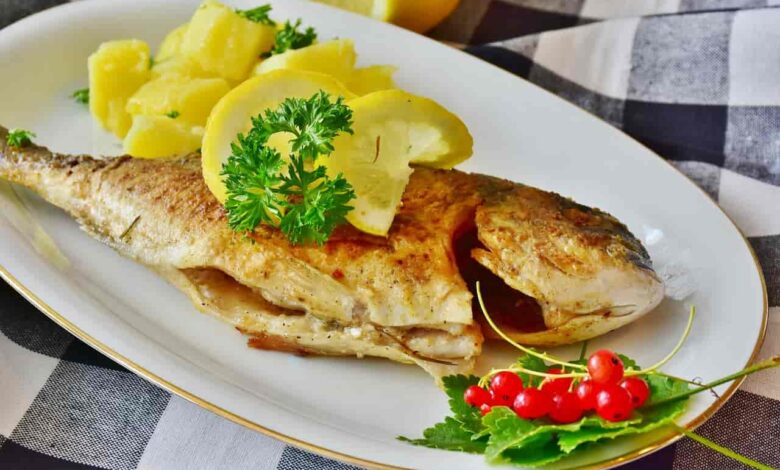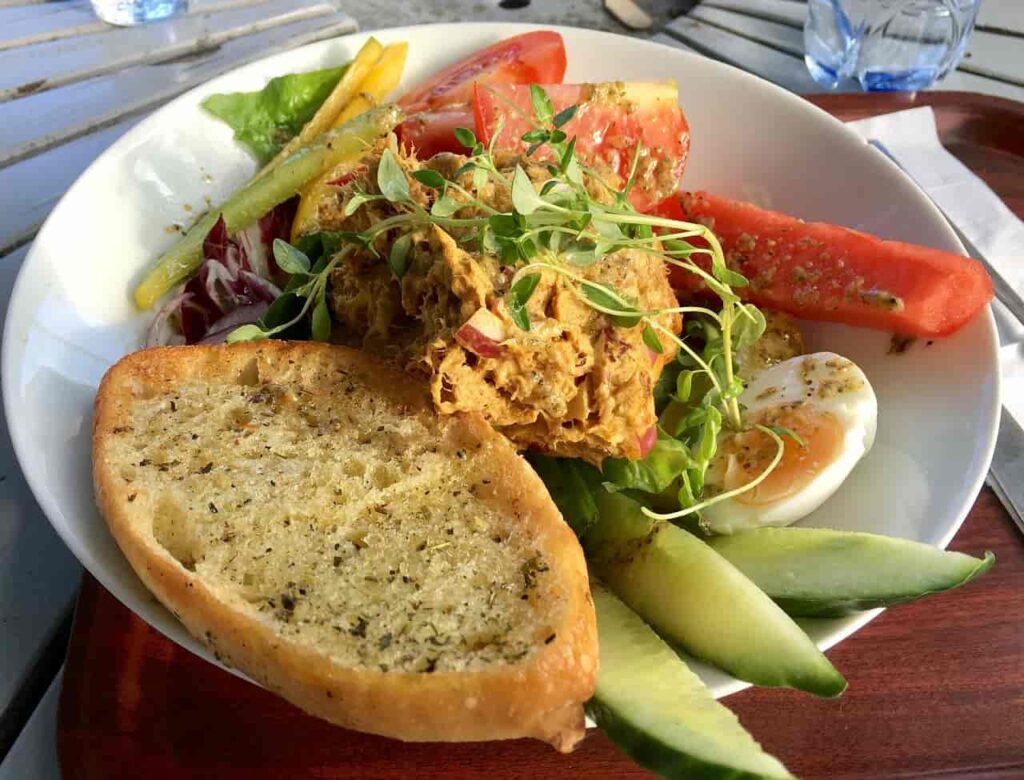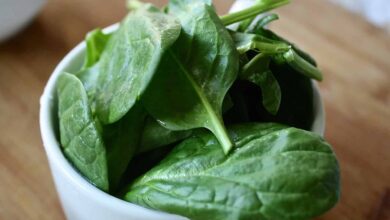Can I Eat Tuna During Pregnancy? Is It Safe

Tuna is a type of fish that can be enjoyed during pregnancy with some precautions. Tuna during pregnancy, it’s important to be mindful of the type of tuna consumed. Certain types of tuna may be harmful to the developing baby’s nervous system. Pregnant women are generally advised to limit the consumption of high-mercury fish, such as bigeye, ahi, and albacore tuna. light canned tuna is considered a safer choice, as it typically contains lower levels of mercury. To ensure a healthy pregnancy, it’s recommended to consult with a healthcare professional or a registered dietitian who can provide specific guidance tailored to individual circumstances and dietary needs.
What is Tuna?

Tuna is a type of fish that belongs to the family Scombridae. It is known for its sleek body, streamlined shape, and powerful swimming ability. Tuna can be found in both saltwater and some species in freshwater environments. They are highly migratory and can travel long distances in search of food and suitable breeding grounds. Tuna is a popular seafood choice around the world, prized for its firm, flavorful flesh. It is often used in dishes such as sushi, sashimi, and grilled steaks.
Tuna is also a valuable resource for commercial fishing, supporting numerous industries and providing livelihoods for many people. overfishing and habitat destruction pose significant threats to tuna populations, highlighting the need for sustainable fishing practices to ensure their long-term survival.
Is Tuna Good For You?
Tuna can be a beneficial addition to a balanced diet. It is a good source of high-quality protein, which is essential for muscle growth and repair. Tuna also contains omega-3 fatty acids, which are known for their heart-healthy properties and potential benefits for brain function. These fatty acids have been associated with a reduced risk of heart disease and inflammation. Tuna during Pregnancy is a rich source of several important minerals, such as selenium, potassium, and magnesium.
It is worth noting that some types of tuna may contain higher levels of mercury, which can be harmful if consumed in excessive amounts. It is recommended to choose lower-mercury options, such as light canned tuna, and moderate consumption for overall health and well-being. Consulting with a healthcare professional or a registered dietitian can provide personalized advice based on individual dietary needs and health conditions.
Is Canned Tuna Safe to Eat While Pregnant?
When it comes to the safety of canned tuna during pregnancy, there are a few things to consider. Canned tuna is generally considered safe to eat while pregnant, but it’s important to be aware of potential risks. One concern is the mercury content in certain types of tuna, as high levels of mercury can be harmful to the developing baby. Most canned tuna options, particularly those labeled as light tuna, typically have lower levels of mercury compared to other varieties.
To ensure safety, it’s advisable to consume canned tuna in moderation and choose reputable brands that follow strict quality control measures. Additionally, pregnant women should be cautious about consuming raw or undercooked tuna, as it may carry a risk of foodborne illnesses. It is always a good idea to consult with a healthcare professional or a registered dietitian to get personalized advice on safe seafood choices during pregnancy.
Benefits of Tuna During Pregnancy

1. Protein Source
Tuna is a rich source of high-quality protein, which is essential for the growth and development of tissues, muscles, and organs in both the mother and the baby.
2. Omega-3 Fatty Acids
Tuna contains omega-3 fatty acids, particularly DHA (docosahexaenoic acid), which play a crucial role in the development of the baby’s brain and eyes.
3. Hydration
Tuna is a good source of moisture, contributing to overall hydration during pregnancy.
4. Iron Content
Tuna contains iron, an important mineral needed for the production of red blood cells. Sufficient iron intake helps prevent anemia and supports oxygen transport in the body.
5. Vitamin B12
Tuna is a natural source of vitamin B12, which is important for the production of red blood cells and the maintenance of a healthy nervous system.
6. Vitamin D
Tuna contains vitamin D, which supports bone health and aids in the absorption of calcium, crucial for the baby’s skeletal development.
7. Fiber Content
Tuna, especially if consumed with whole-grain bread or whole-wheat pasta, can contribute to a fiber-rich diet, promoting healthy digestion and preventing constipation during pregnancy.
8. Potassium
Tuna is a good source of potassium, an essential mineral that helps regulate blood pressure and maintain proper fluid balance in the body.
9. Energy Boost
The protein and healthy fats in tuna can provide sustained energy throughout the day, combating fatigue often experienced during pregnancy.
10. Nutrient Variety
Incorporating tuna into a well-balanced diet can help diversify nutrient intake, providing a range of essential vitamins and minerals necessary for a healthy pregnancy.
How to Cook Tuna Steak When Pregnant?
Cooking tuna steak during pregnancy can be a delicious and nutritious option. Here’s a simple guide on how to cook tuna steak while keeping in mind pregnancy:
- Choose fresh tuna steak: Select high-quality, fresh tuna steak from a reputable source to ensure its freshness and minimize any potential risks.
- Thawing safely: If using frozen tuna steak, thaw it thoroughly in the refrigerator overnight or according to the package instructions. Avoid thawing at room temperature to prevent bacterial growth.
- Marination: Marinate the tuna steak in a flavorful marinade of your choice. Ensure that the marinade does not contain any unpasteurized or raw ingredients to avoid the risk of foodborne illnesses. Common marinade options include olive oil, lemon juice, garlic, herbs, and spices.
- Preheat and prepare the grill or pan: Preheat your grill or pan over medium-high heat. If using a grill, ensure the grates are clean and lightly oiled to prevent sticking.
- Cooking time and temperature: Cook the tuna steak for approximately 2-3 minutes per side, depending on the thickness of the steak. The goal is to have a seared exterior while leaving the center pink and moist. Ensure the internal temperature reaches at least 145°F (63°C) to ensure food safety.
- Avoid overcooking: Be cautious not to overcook the tuna steak, as it can become dry and lose its tenderness. Remember that slightly pink or medium-rare tuna is safe to eat if it has been handled and cooked properly.
- Checking for doneness: To check the doneness, use a fork to gently separate the flakes of the cooked tuna steak. It should be opaque and easily flake apart.
- Serving suggestions: Serve the cooked tuna steak with a side of vegetables or a salad. Avoid unpasteurized dressings or sauces that may pose a risk during pregnancy.
Remember to follow safe food handling practices throughout the cooking process, such as washing hands thoroughly, avoiding cross-contamination with other ingredients, and ensuring all utensils and surfaces are clean. If you have any concerns or specific dietary restrictions during pregnancy, consult with a healthcare professional or a registered dietitian for personalized guidance.
Dishes That Contain Tuna & Their Pregnancy Safety

Tuna salad (including tuna mayonnaise salads)
- Start with canned or cooked tuna flakes/chunks.
- Mix it with mayonnaise, lemon juice, salt, and pepper for flavor.
- Add diced vegetables such as celery, onions, and pickles for crunch and additional taste.
- Optional ingredients can include hard-boiled eggs, chopped herbs (like parsley or dill), or mustard for added variety.
- Serve the tuna salad on a bed of lettuce, as a sandwich filling, or with crackers for a light and refreshing meal.
Tuna Bakes or Tuna Casserole
- Combine cooked noodles (such as macaroni or penne) with canned tuna in a baking dish.
- Mix in a creamy sauce made from ingredients like condensed cream of mushroom soup, milk, cheese, and seasonings.
- Add additional vegetables like peas, carrots, or mushrooms for extra nutrients and flavor.
- Top the mixture with breadcrumbs or cheese for a crispy and golden crust.
- Bake in the oven until bubbly and heated through for a comforting and satisfying dish.
Tuna Sandwiches (including Tuna melts, paninis, etc.)
- Spread mayonnaise or your preferred condiments (such as mustard or hummus) onto slices of bread.
- Layer slices of canned or cooked tuna onto the bread.
- Add desired toppings such as lettuce, tomato, cucumber, avocado, or cheese for extra taste and texture.
- For a tuna melt, place the sandwich under a broiler or in a toaster oven until the cheese is melted and bubbly.
- Grill the sandwich in a panini press or on a stovetop for a warm and crispy variation.
Grilled or seared tuna steak
- Preheat the grill or a skillet over medium-high heat.
- Brush the tuna steak with olive oil and season it with salt, pepper, and desired herbs or spices.
- Cook the steak for approximately 2-3 minutes per side, depending on thickness, for medium-rare doneness.
- Avoid overcooking to maintain the tuna steak’s juiciness and tenderness.
- Serve the grilled or seared tuna steak with a side of vegetables, rice, or salad for a flavorful and protein-rich meal.
How Much Tuna is Considered Safe During Pregnancy?
The amount of tuna considered safe during pregnancy depends on the type of tuna and its mercury content. It is recommended to consume a variety of fish and seafood. Here are some general guidelines regarding tuna consumption during pregnancy:
- Mercury Levels: Certain types of tuna, such as bigeye, ahi, and albacore tuna (also known as white tuna), may contain higher levels of mercury.
- Light Canned Tuna: Light canned tuna generally contains lower levels of mercury compared to other varieties. It is considered a safer choice for consumption during pregnancy. However, it is still recommended to moderate intake and balance it with other seafood options.
- Serving Size: The recommended serving size of fish or seafood during pregnancy is typically around 8-12 ounces (about 227-340 grams) per week. This includes all types of fish and seafood combined.
- Variety: To ensure a well-rounded nutrient intake, it’s beneficial to include a variety of seafood options in your diet. This helps diversify nutrient profiles and minimize exposure to any single contaminant.
- Consult with Healthcare Professionals: It’s crucial to consult with a healthcare professional or a registered dietitian who can provide personalized advice based on your circumstances, dietary needs, and any specific concerns you may have.
Nutrition of Tuna
| Nutrient | Amount per 100 grams (raw) |
|---|---|
| Calories | 184 |
| Protein | 29 grams |
| Fat | 6 grams |
| Saturated Fat | 1.3 grams |
| Omega-3 Fatty Acids | 0.9 grams |
| Omega-6 Fatty Acids | 0.1 grams |
| Cholesterol | 39 milligrams |
| Sodium | 48 milligrams |
| Potassium | 377 milligrams |
| Vitamin D | 9.5 micrograms |
| Vitamin B12 | 2.3 micrograms |
| Niacin | 10.6 milligrams |
| Magnesium | 36 milligrams |
| Phosphorus | 227 milligrams |
| Iron | 1 milligram |
FAQ’s
Can I eat tuna during pregnancy?
Yes, you can eat tuna during pregnancy, but it’s important to consider certain factors and make informed choices.
Is it safe to consume canned tuna while pregnant?
Yes, consuming canned tuna can be safe tuna during pregnancy. However, it’s recommended to choose lower-mercury options like light canned tuna and moderate your intake.
How much tuna can I eat during pregnancy?
The general recommendation is to consume around 8-12 ounces (about 227-340 grams) of fish and seafood, including tuna, per week tuna during pregnancy.
Are there any risks associated with eating tuna during pregnancy?
Eating certain types of tuna during pregnancy, especially those high in mercury, can pose risks to the developing baby’s nervous system. It’s important to choose lower-mercury options and moderate consumption.
Which types of tuna are safer to consume during pregnancy?
Light canned tuna during pregnancy is considered a safer choice during pregnancy as it generally contains lower levels of mercury compared to other varieties like bigeye or albacore tuna.
What are the benefits of eating tuna while pregnant?
Tuna during pregnancy is a good source of protein and omega-3 fatty acids, which are essential for the baby’s growth and development. It also provides nutrients like vitamin B12, vitamin D, and potassium.
Can eating too much tuna during pregnancy be harmful?
Consuming excessive amounts of tuna, particularly high-mercury varieties, can increase the risk of mercury toxicity. It’s important to balance tuna consumption and consider other seafood options for variety.
Are there any alternatives to tuna that provide similar nutritional benefits during pregnancy?
Yes, Tuna during pregnancy but there are other seafood options like salmon, sardines, and trout that provide similar nutritional benefits such as omega-3 fatty acids and protein.
Should I be concerned about mercury levels in tuna during pregnancy?
Yes, it’s important to be mindful of mercury levels in tuna during pregnancy and choose lower-mercury options to minimize potential risks. Moderation and variety in seafood consumption are key.
Can I consume cooked or seared tuna steak during pregnancy?
Yes, cooked or seared tuna steak can be enjoyed tuna during pregnancy. It’s important to ensure proper cooking to eliminate any potential bacteria and to choose lower-mercury tuna options.
Conclusion:
Exploring the correlation between physical well-being, dietary decisions, and nutrition, this comprehensive article emphasizes the importance of prioritizing overall health and seeking guidance from healthcare experts, whether you are currently pregnant or have undergone a pregnancy termination.
- For more articles on related topics, please visit our Homepage.




